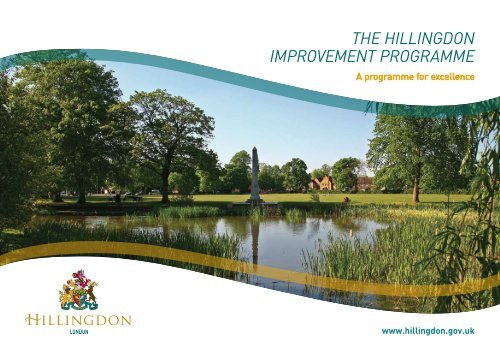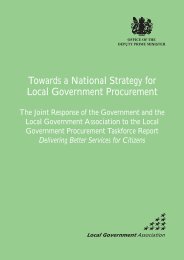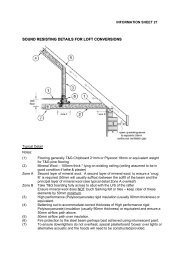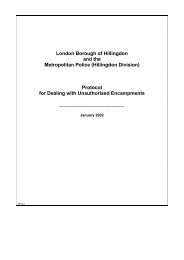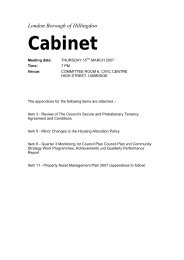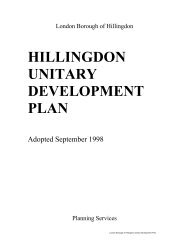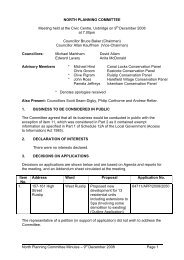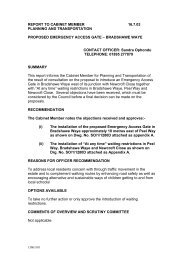the hillingdon improvement programme - London Borough of ...
the hillingdon improvement programme - London Borough of ...
the hillingdon improvement programme - London Borough of ...
Create successful ePaper yourself
Turn your PDF publications into a flip-book with our unique Google optimized e-Paper software.
THE HILLINGDON<br />
IMPROVEMENT PROGRAMME<br />
A <strong>programme</strong> for excellence<br />
www.<strong>hillingdon</strong>.gov.uk
Hillingdon Council’s vision<br />
“A modern, well managed council<br />
delivering excellent services.”<br />
Cllr Ray Puddifoot<br />
Leader <strong>of</strong> <strong>the</strong> Council
The Hillingdon Improvement Programme<br />
3<br />
Contents<br />
1 Introduction by Councillor Ray Puddifoot, Leader <strong>of</strong> <strong>the</strong> Council 4<br />
2 Message from Hugh Dunnachie, Chief Executive 6<br />
3 Overview <strong>of</strong> <strong>the</strong> Hillingdon Improvement Programme (HIP) 2007 7<br />
4 The HIP Steering Group 8<br />
5 The HIP work streams 10<br />
6 HIP achievements 2007 12<br />
7 The Hillingdon Improvement Programme (HIP) going forward into 2008 28<br />
8 People, Resources, Culture 30
Hugh Dunnachie, Chief Executive and<br />
Cllr Ray Puddifoot, Leader <strong>of</strong> <strong>the</strong> Council
The Hillingdon Improvement Programme<br />
5<br />
Introduction by Councillor Ray Puddifoot,<br />
Leader <strong>of</strong> <strong>the</strong> Council<br />
Welcome to <strong>the</strong> Hillingdon Improvement Programme (HIP)<br />
annual report for 2007. HIP is a council-wide <strong>programme</strong>,<br />
which aims to deliver excellence as set out in my vision for<br />
<strong>the</strong> council.<br />
When I became Leader <strong>of</strong> <strong>the</strong> Council in 2000, it was clear<br />
to me that we had a lot <strong>of</strong> work to do to change <strong>the</strong> culture<br />
and operating model <strong>of</strong> <strong>the</strong> council if we were to improve <strong>the</strong><br />
services we deliver to our residents.<br />
In 2003, following a business process re-engineering<br />
exercise using external consultants, I introduced HIP as a<br />
way <strong>of</strong> speeding up our ambitious <strong>improvement</strong> agenda. My<br />
intention is to build a more customer-focussed organisation,<br />
to modernise our business processes and to free up<br />
resources to provide improved services for our residents.<br />
From its inception, I have led HIP by chairing <strong>the</strong> steering<br />
group to ensure that we remain focused on <strong>the</strong> needs <strong>of</strong> our<br />
residents above all else.<br />
HIP has already been extremely successful, helping us<br />
to achieve financial stability, increased capacity and a<br />
change <strong>of</strong> culture across <strong>the</strong> organisation. However, 2007<br />
saw unprecedented change in our organisation, with HIP<br />
delivering substantial <strong>improvement</strong>s both in <strong>the</strong> way we<br />
work and in <strong>the</strong> way we deliver services to our residents.<br />
As Leader <strong>of</strong> <strong>the</strong> Council, I am immensely proud <strong>of</strong> all that<br />
HIP has achieved and <strong>the</strong> changes that can be seen both<br />
inside and outside our council.<br />
I have said many times that <strong>the</strong> real test <strong>of</strong> how well we are<br />
doing is what our residents think about us. HIP has delivered<br />
many <strong>improvement</strong>s in <strong>the</strong> last 12 months and looking ahead<br />
to <strong>the</strong> coming year, our increasingly ambitious Hillingdon<br />
Improvement Programme, which o<strong>the</strong>r councils are now<br />
looking to emulate, will fur<strong>the</strong>r improve our residents’<br />
satisfaction with <strong>the</strong>ir council, our staff and our services.<br />
Cllr Ray Puddifoot<br />
Leader <strong>of</strong> <strong>the</strong> Council
6 The Hillingdon Improvement Programme<br />
Message from Hugh Dunnachie,<br />
Chief Executive<br />
The Hillingdon Improvement Programme has played a<br />
crucial role in helping us to make <strong>the</strong> changes we need<br />
to deliver our vision and priorities. It has been key to us<br />
delivering a range <strong>of</strong> <strong>improvement</strong>s over <strong>the</strong> last year,<br />
to achieve our vision - a modern, well-managed council<br />
delivering excellent services.<br />
By working as one council, we are transforming <strong>the</strong> way we<br />
work, our practices and many <strong>of</strong> our buildings and facilities<br />
– this all adds up to us being a modern council, fit for <strong>the</strong><br />
21st Century.<br />
But what makes HIP so special is that we did it ourselves<br />
– HIP is a home grown project, delivered by our managers<br />
and staff, who have played a crucial role in helping us deliver<br />
HIP. Our heads <strong>of</strong> service and service managers are leading<br />
many <strong>of</strong> <strong>the</strong> cross-cutting initiatives, which are being driven<br />
by staff from across <strong>the</strong> organisation, helping to transform<br />
our council.<br />
Under <strong>the</strong> three <strong>the</strong>mes <strong>of</strong> People, Resources and<br />
Culture, we have made significant progress in developing<br />
our council, its people and <strong>the</strong> way we deliver services.<br />
As well as putting in place <strong>the</strong> high-level building blocks,<br />
such as re-structuring <strong>the</strong> council, sound financial<br />
management, service reviews and a robust approach to<br />
assessing and improving competency and performance, HIP<br />
has also delivered a range <strong>of</strong> <strong>improvement</strong>s and initiatives<br />
that are making a difference.<br />
HIP has also helped us to be better at sharing good ideas and<br />
good practice across all parts <strong>of</strong> <strong>the</strong> council. Increasingly,<br />
we are gaining a reputation as an innovative council, seen<br />
by o<strong>the</strong>r councils and organisations as <strong>the</strong> leader in a<br />
particular field.<br />
The Hillingdon Improvement Programme has helped us to<br />
transform <strong>the</strong> way we work and will continue to provide <strong>the</strong><br />
framework for even greater <strong>improvement</strong>s in 2008.<br />
Hugh Dunnachie<br />
Chief Executive
The Hillingdon Improvement Programme<br />
7<br />
Overview <strong>of</strong> <strong>the</strong> Hillingdon Improvement<br />
Programme (HIP) 2007<br />
Most local authorities will have embarked on<br />
change management <strong>programme</strong>s in order<br />
to meet local challenges and respond to <strong>the</strong><br />
outcome <strong>of</strong> inspections or changes to statutory<br />
responsibilities. These are <strong>of</strong>ten designed to deal<br />
with a specific task and are time limited.<br />
But how many councils have developed an<br />
ambitious, wide-ranging and home grown<br />
<strong>programme</strong> - and made it work? At <strong>the</strong> <strong>London</strong><br />
<strong>Borough</strong> <strong>of</strong> Hillingdon that’s exactly what we did.<br />
The Hillingdon Improvement Programme (HIP)<br />
is an internal, council-wide transformational<br />
<strong>programme</strong> that incorporates all elements <strong>of</strong> <strong>the</strong><br />
council’s change and <strong>improvement</strong> <strong>programme</strong>.<br />
The <strong>programme</strong> is directed through <strong>the</strong> HIP<br />
Steering Group, led by <strong>the</strong> Leader <strong>of</strong> <strong>the</strong> Council,<br />
Cllr Ray Puddifoot with Chief Executive, Hugh<br />
Dunnachie and Cllr Douglas Mills, Cabinet Member<br />
for Improvement, Partnerships and Community<br />
Safety. Going forward, workstreams will involve<br />
more cabinet members and council staff.<br />
O<strong>the</strong>r cabinet members and all <strong>of</strong> <strong>the</strong> council’s<br />
directors are responsible for specific parts <strong>of</strong> HIP.<br />
Launched in 2003, HIP has changed <strong>the</strong> culture<br />
and ethos <strong>of</strong> <strong>the</strong> council and generated a muchneeded<br />
focus across <strong>the</strong> organisation in <strong>the</strong> drive<br />
towards council-wide <strong>improvement</strong>. At <strong>the</strong> same<br />
time as delivering improved services, <strong>the</strong> HIP ethos<br />
has allowed us to generate savings <strong>of</strong> £26.5m. This<br />
means we are now able to run <strong>the</strong> council for less<br />
than at any o<strong>the</strong>r time, helping to deliver better<br />
value for money for Hillingdon’s residents, while at<br />
<strong>the</strong> same time, see our services improve.<br />
HIP is not only delivering <strong>the</strong> efficiency and service<br />
agenda for Hillingdon, but it is also delivering real<br />
<strong>improvement</strong>s for residents.<br />
In January 2007, The Leader <strong>of</strong> <strong>the</strong> Council and<br />
Chief Executive developed eight ambitious new<br />
workstreams to focus on specific areas <strong>of</strong> work<br />
under HIP:<br />
1 Leadership and direction<br />
2 Management capability and capacity<br />
3 Performance management<br />
4 Organisational development<br />
5 Finance<br />
6 Customer focus<br />
7 Performance <strong>improvement</strong><br />
8 Communications
8 The Hillingdon Improvement Programme<br />
Cllr Ray Puddifoot<br />
Leader <strong>of</strong> <strong>the</strong> Council<br />
Chairman<br />
Cllr Mills<br />
Cabinet Member<br />
for Improvement,<br />
Partnership and<br />
Community Safety<br />
Cllr Seaman-Digby<br />
Cabinet Member for<br />
Co-ordination and<br />
Central Services<br />
Hugh Dunnachie<br />
Chief Executive<br />
Programme Lead<br />
Jean Palmer<br />
Director <strong>of</strong> Planning and<br />
Community Services<br />
Jeff Maslen<br />
Director <strong>of</strong> Adult Social<br />
Care, Health and Housing<br />
Philomena Bach<br />
Director <strong>of</strong> Environment<br />
and Consumer Protection<br />
Christopher Neale<br />
Director <strong>of</strong> Finance and<br />
Resources<br />
Chris Spencer<br />
Director <strong>of</strong> Education and<br />
Children’s Services
The Hillingdon Improvement Programme<br />
9<br />
The HIP Steering Group<br />
The HIP Steering group was set up to drive forward<br />
HIP’s ambitious <strong>improvement</strong> agenda both at <strong>the</strong><br />
top <strong>of</strong> <strong>the</strong> organisation and across all parts <strong>of</strong> <strong>the</strong><br />
council.<br />
Ray Puddifoot, Leader <strong>of</strong> <strong>the</strong> Council is Chairman<br />
and overall <strong>programme</strong> sponsor for HIP, providing<br />
<strong>the</strong> strategic leadership. He is supported by<br />
Councillors Douglas Mills and Scott Seaman-<br />
Digby, who provide direction for <strong>the</strong> <strong>programme</strong>.<br />
All <strong>of</strong> <strong>the</strong> council’s directors, working with a<br />
cabinet member, sponsor one <strong>of</strong> <strong>the</strong> workstreams,<br />
to ensure that activities are closely co-ordinated<br />
across <strong>the</strong> council and to monitor delivery <strong>of</strong> work<br />
under <strong>the</strong>ir work stream.<br />
Each <strong>of</strong> <strong>the</strong> workstreams is led by one <strong>of</strong> <strong>the</strong><br />
council’s senior managers, who ensure that<br />
<strong>the</strong> work <strong>programme</strong> for <strong>the</strong>ir workstream is<br />
delivered.<br />
Going forward, workstreams will involve more<br />
cabinet members and council staff.<br />
Hugh Dunnachie, Chief Executive is Programme<br />
Director, reporting directly to <strong>the</strong> <strong>programme</strong><br />
sponsor with overall responsibility for ensuring<br />
<strong>the</strong> delivery <strong>of</strong> <strong>the</strong> <strong>programme</strong>.
10 The Hillingdon Improvement Programme<br />
Susie Kemp Pat Blackshire Claire Palmer Paul Whaymand Steve Palmer David Holdstock
The Hillingdon Improvement Programme<br />
11<br />
The HIP workstreams<br />
During 2007, a key part <strong>of</strong> <strong>the</strong> success <strong>of</strong> HIP<br />
and <strong>the</strong> evident impact it is having on <strong>the</strong> whole<br />
organisation, is as a result <strong>of</strong> robust leadership<br />
and that <strong>the</strong> <strong>improvement</strong> <strong>programme</strong> is owned<br />
corporately.<br />
The relationships between workstream sponsors<br />
and <strong>the</strong> managers have been strong and successful<br />
cross working has been <strong>the</strong> key to positive<br />
outcomes.<br />
Examples <strong>of</strong> successful corporate working include:<br />
• Service reviews<br />
• Thematic reviews<br />
• Development <strong>of</strong> <strong>the</strong> Performance and Development<br />
Appraisal (PADA) process<br />
• Life changes projects<br />
Almost all <strong>of</strong> <strong>the</strong> work was delivered within<br />
existing resources, fur<strong>the</strong>r enhancing <strong>the</strong><br />
council’s approach to value for money and building<br />
sustainability and capacity around managing<br />
change across <strong>the</strong> organisation.<br />
Each <strong>of</strong> <strong>the</strong> workstreams had a clear <strong>programme</strong><br />
<strong>of</strong> work with clear outcomes. To ensure work was<br />
being delivered to targets, timescales and budget,<br />
each <strong>of</strong> <strong>the</strong> workstreams reports progress monthly<br />
to <strong>the</strong> HIP Steering Group.
12 The Hillingdon Improvement Programme<br />
HIP achievements 2007<br />
Leadership and direction workstream<br />
The leadership and direction work stream was set<br />
up to:<br />
• establish ways <strong>of</strong> working and <strong>the</strong> split <strong>of</strong> roles<br />
and responsibilities between <strong>the</strong> cabinet and<br />
Corporate Management Team (CMT)<br />
• establish clear ways <strong>of</strong> working between CMT and<br />
<strong>the</strong> Operational Managers Group (OMG)<br />
• develop and embed <strong>the</strong> ‘one council’ approach to<br />
support <strong>the</strong> HIP <strong>the</strong>mes and <strong>the</strong> council’s vision<br />
- a modern, well managed council delivering<br />
excellent services<br />
Cabinet Sponsor<br />
Cllr Ray Puddifoot<br />
Leader <strong>of</strong> <strong>the</strong> Council<br />
Workstream Sponsor<br />
Hugh Dunnachie<br />
Chief Executive<br />
Workstream Manager<br />
Susie Kemp<br />
Head <strong>of</strong> Organisational<br />
Development and<br />
Performance Improvement<br />
The leadership and direction workstream has<br />
focused on ensuring <strong>the</strong> top levels <strong>of</strong> <strong>the</strong> organisation<br />
are working efficiently and collaboratively, with<br />
clear direction and understanding <strong>of</strong> roles. This<br />
has ensured that senior mangers have been able<br />
to take a more strategic approach to delivering <strong>the</strong><br />
council’s priorities.
The Hillingdon Improvement Programme<br />
13<br />
There has been noticeable change in <strong>the</strong> culture<br />
<strong>of</strong> <strong>the</strong> organisation, leading to visible, improved<br />
leadership and communication across <strong>the</strong><br />
organisation. Changes in behaviour have also been<br />
identified and developed with more people wanting<br />
to contribute to <strong>the</strong> workstreams.<br />
A direct consequence <strong>of</strong> that change in culture is<br />
that managers in particular, but also staff at all<br />
levels understand what is expected <strong>of</strong> <strong>the</strong>m and<br />
are taking an innovative and “can-do” approach to<br />
improving <strong>the</strong> organisation.<br />
Once <strong>the</strong> Operational Managers Group (OMG) was<br />
set up, <strong>the</strong> leadership and direction workstream was<br />
responsible for ensuring that it works effectively<br />
alongside CMT to add value to <strong>the</strong> decision making<br />
process. OMG has been a successful addition to<br />
<strong>the</strong> management structure <strong>of</strong> <strong>the</strong> organisation.<br />
Outcomes and achievements<br />
• Generic role pr<strong>of</strong>iles are now in place for<br />
directors, heads <strong>of</strong> service and service managers,<br />
clearly setting out roles and responsibilities <strong>of</strong> <strong>the</strong><br />
‘Hillingdon manager’<br />
• A set <strong>of</strong> competencies developed for directors,<br />
heads <strong>of</strong> service and service managers which<br />
underpin <strong>the</strong> generic pr<strong>of</strong>ile<br />
• A new appraisal process introduced for directors,<br />
which now involves <strong>the</strong> Leader and Cabinet<br />
member in <strong>the</strong> appraisal process<br />
• A revised simpler and easier to use Performance<br />
and Development Appraisal (PADA) process is<br />
now in place for all staff, who will be assessed<br />
against <strong>the</strong> new competency framework every six<br />
months<br />
• Work was undertaken to develop working<br />
relationships and terms <strong>of</strong> reference for <strong>the</strong><br />
Operational Managers’ Group (OMG)<br />
• A new leadership and management development<br />
<strong>programme</strong> (LMDP) is being introduced and<br />
learning and development needs are being<br />
identified to drive <strong>the</strong> establishment <strong>of</strong> <strong>the</strong><br />
development <strong>of</strong> <strong>the</strong> LMDP for directors, heads <strong>of</strong><br />
service and service managers with a corporate<br />
management <strong>programme</strong> for team managers and<br />
supervisors<br />
• The council plan - Fast Forward to 2010 - was<br />
refreshed setting out <strong>the</strong> council’s priorities for<br />
<strong>the</strong> next three years. It was widely circulated<br />
amongst partners, stakeholders and sent to o<strong>the</strong>r<br />
councils in <strong>London</strong>. At <strong>the</strong> 2007 staff roadshows,<br />
every member <strong>of</strong> staff was given a personal copy<br />
<strong>of</strong> <strong>the</strong> council plan.
14 The Hillingdon Improvement Programme<br />
HIP achievements 2007<br />
Management capability and capacity workstream<br />
The management capability and capacity<br />
workstream was set up to:<br />
• complete <strong>the</strong> development <strong>of</strong> capability needs <strong>of</strong><br />
all heads <strong>of</strong> service and service managers<br />
• establish an overall human resources strategy<br />
and plan<br />
• identify management capability and capacity<br />
needs at service manager level and implement<br />
solutions in response<br />
• develop <strong>the</strong> management talent <strong>of</strong> <strong>the</strong> council,<br />
specifically through <strong>the</strong> establishment <strong>of</strong> a<br />
Hillingdon Academy<br />
Cabinet Sponsor<br />
Cllr Ray Puddifoot<br />
Leader <strong>of</strong> <strong>the</strong> Council<br />
Workstream Sponsor<br />
Jeff Maslen<br />
Director, Adult Social Care<br />
Health and Housing<br />
Workstream Manager<br />
Claire Palmer<br />
Corporate Personnel<br />
Manager<br />
To ensure <strong>the</strong> council has <strong>the</strong> right people in<br />
place, doing <strong>the</strong> right jobs, a review was carried<br />
out <strong>of</strong> <strong>the</strong> skills and competencies required by <strong>the</strong><br />
organisation’s managers to deliver its vision and<br />
priorities. This work has been key to ensuring<br />
<strong>the</strong> council has strong managers and high quality<br />
leaders.
The Hillingdon Improvement Programme<br />
15<br />
Human Resources (HR) is working with managers<br />
to ensure to review all HR polices so that <strong>the</strong>y are<br />
robustly tested and external input is also being<br />
used to bring expertise and experience from o<strong>the</strong>r<br />
organisations.<br />
Reviewing all <strong>the</strong> policies will also remove barriers,<br />
perceived or o<strong>the</strong>rwise, that are in <strong>the</strong> way <strong>of</strong> a<br />
proactive, positive, fair and consistent approach to<br />
<strong>the</strong> management <strong>of</strong> staff.<br />
A continuous process <strong>of</strong> review and challenge will<br />
<strong>the</strong>n be business as usual for HR to ensure that<br />
flexible and innovative development <strong>of</strong> policies<br />
is ongoing and meets <strong>the</strong> changing needs <strong>of</strong> <strong>the</strong><br />
business.<br />
Following a review <strong>of</strong> HR policies, fur<strong>the</strong>r work is<br />
being undertaken to look at:<br />
• changes to <strong>the</strong> presentation and content <strong>of</strong> <strong>the</strong><br />
policies, including length, language, layout and<br />
access<br />
• enhancing skills to implement <strong>the</strong> policies (with<br />
specific links to <strong>the</strong> management development<br />
<strong>programme</strong>)<br />
• organisation culture (ensuring all policies are<br />
linked to <strong>the</strong> HR strategy and workforce plan)<br />
• HR support to managers and <strong>the</strong> organisation as<br />
a whole.<br />
Outcomes and achievements<br />
• Completed heads <strong>of</strong> service review against<br />
competencies<br />
• Consistent job titles for heads <strong>of</strong> service and<br />
service managers and support services<br />
• Introduced minimum and maximum <strong>of</strong> direct<br />
reports at a management and delivery team level<br />
• Implemented competencies for service managers<br />
and completed review for approximately 90<br />
managers. These competencies are now<br />
incorporated into o<strong>the</strong>r HR policies, including <strong>the</strong><br />
recruitment and selection policy. They now form<br />
an integral part <strong>of</strong> <strong>the</strong> person specification for all<br />
posts to ensure that staff are appointed who are<br />
able to meet <strong>the</strong> council’s requirements.<br />
• This exercise also ensured that <strong>the</strong> implementation<br />
<strong>of</strong> <strong>the</strong> new PADA process with competencies for<br />
all staff was more effective as managers had had<br />
experience <strong>of</strong> <strong>the</strong> competencies and ratings.<br />
• Working with managers from across <strong>the</strong><br />
council and people from outside <strong>the</strong> council, a<br />
comprehensive review <strong>of</strong> all 170 HR documents,<br />
covering 80 policy areas has been completed to<br />
make sure <strong>the</strong>y are effective, efficient and fit-orpurpose.<br />
• “Rising stars” are being identified for <strong>the</strong> Hillingdon<br />
Academy, which was launched in December<br />
2007.<br />
The council is taking an innovative approach<br />
to developing its people. As part <strong>of</strong> <strong>the</strong> work to<br />
develop <strong>the</strong> council’s managers and leaders <strong>of</strong><br />
<strong>the</strong> future and improve succession planning in<br />
<strong>the</strong> organisation, <strong>the</strong> Hillingdon Academy was<br />
launched in December 2007. More than 30 <strong>of</strong> <strong>the</strong><br />
council’s ‘rising stars’ and senior managers <strong>of</strong> <strong>the</strong><br />
future were selected to be part <strong>of</strong> <strong>the</strong> first intake<br />
into <strong>the</strong> academy.<br />
The ‘virtual’ academy will provide a mix <strong>of</strong> learning<br />
and development methods, which will include<br />
partnerships with <strong>the</strong> business sector, <strong>of</strong>fering<br />
secondments and opportunities to work on projects<br />
within business, as well as in <strong>the</strong> public sector.
16 The Hillingdon Improvement Programme<br />
HIP achievements 2007<br />
Performance management workstream<br />
The performance management workstream was<br />
set up to:<br />
• review and improve performance management<br />
across <strong>the</strong> council so that:<br />
- <strong>the</strong>re is a clear and transparent link between<br />
council priorities and directorate and team<br />
goals<br />
- individual performance can be more effectively<br />
assessed, measured and developed in line with<br />
<strong>the</strong> council’s priorities<br />
Cabinet Sponsor<br />
Cllr Scott Seaman-Digby<br />
Cabinet Member for<br />
Co-ordination and<br />
Central Services<br />
Workstream Sponsor<br />
Philomena Bach<br />
Director, Environment<br />
and Consumer Protection<br />
Workstream Manager<br />
Susie Kemp<br />
Head <strong>of</strong> Organisational<br />
Development and<br />
Performance Improvement<br />
This workstream is key to every member <strong>of</strong><br />
council staff understanding <strong>the</strong>ir role in delivering<br />
<strong>the</strong> council vision and priorities. Its purpose was<br />
to review, build on, modify and replace existing<br />
performance management arrangements in order<br />
to:<br />
• more clearly identify <strong>the</strong> accountability for<br />
performance and o<strong>the</strong>r outcomes at corporate<br />
director level
The Hillingdon Improvement Programme<br />
17<br />
• specifically ensure that <strong>the</strong> new Deputy Chief<br />
Executive role is equipped and functions effectively<br />
in leading <strong>the</strong> drive for better management,<br />
measurement and delivery <strong>of</strong> performance across<br />
<strong>the</strong> council<br />
• ensure that council priorities are transparently<br />
translated into directorate and lower level plans<br />
and that processes are in place so that this state<br />
<strong>of</strong> affairs becomes ‘business as usual’<br />
• establish measurement, reporting and remedialaction<br />
processes and accountabilities to facilitate<br />
<strong>the</strong> fur<strong>the</strong>r <strong>improvement</strong> <strong>of</strong> service delivery to<br />
residents and <strong>the</strong> efficient management <strong>of</strong> <strong>the</strong><br />
council<br />
• establish a new performance management<br />
regime for managers that supports:<br />
- <strong>the</strong> measurement <strong>of</strong> personal performance<br />
against council priorities<br />
- <strong>the</strong> evaluation <strong>of</strong> performance, behaviours and<br />
personal capability against clearly defined role<br />
pr<strong>of</strong>iles for each level <strong>of</strong> management within <strong>the</strong><br />
council<br />
- establish a staff incentive scheme to encourage<br />
and reward staff for exceptional performance in<br />
pursuit <strong>of</strong> <strong>the</strong> council’s priorities<br />
Outcomes and achievements<br />
• The workstream has achieved its objective <strong>of</strong><br />
identifying <strong>the</strong> accountability for performance and<br />
o<strong>the</strong>r outcomes at corporate director level through<br />
improved service planning. The golden thread<br />
is now thoroughly embedded in <strong>the</strong> organisation<br />
leading to <strong>of</strong>ficers have a clear understanding <strong>of</strong><br />
<strong>the</strong>ir role in delivering <strong>the</strong> council plan. This has<br />
resulted in council priorities being transparently<br />
translated into directorate and lower level plans<br />
and that processes are in place so that this state<br />
<strong>of</strong> affairs becomes ‘business as usual’. This is<br />
evidenced through Group, Service and Team Plans<br />
being done for 2008/9 in a more timely fashion<br />
that will lead into <strong>the</strong> 08/09 <strong>of</strong>ficer PADAs.<br />
• HIP team bonus scheme introduced to underpin<br />
<strong>the</strong> focus on service planning and delivering<br />
excellent services. The scheme uses a mechanism<br />
to stretch team targets and to encourage better<br />
team working. The first winners <strong>of</strong> this scheme<br />
will be announced in May 2008.<br />
• Following a thorough review <strong>of</strong> <strong>the</strong> personal<br />
development and review forms (PADAs),<br />
competencies were introduced for every member<br />
<strong>of</strong> staff – six for employees and 13 for senior<br />
managers – covering all aspects <strong>of</strong> what Hillingdon<br />
is looking for from <strong>the</strong>ir staff and managers.<br />
• The corporate learning and development<br />
<strong>programme</strong> was reviewed to underpin <strong>the</strong><br />
development <strong>of</strong> employees and managers against<br />
<strong>the</strong> new competencies.<br />
• A value for money strategy with a robust action<br />
plan to ensure that VFM is embedded into <strong>the</strong><br />
organisation and understood by every manager so<br />
that value for money is at <strong>the</strong> heart <strong>of</strong> everything<br />
we do as a council.<br />
• A new performance management framework<br />
is now in place, utilising technology to improve<br />
monitoring across <strong>the</strong> council.
18 The Hillingdon Improvement Programme<br />
HIP achievements 2007<br />
Performance <strong>improvement</strong> initiatives workstream<br />
The performance <strong>improvement</strong> initiatives<br />
workstream was set up to:<br />
• implement <strong>the</strong> new HIP performance / efficiency<br />
<strong>improvement</strong> initiatives, to deliver <strong>the</strong> extra<br />
cashable savings required by <strong>the</strong> council for<br />
2007/8<br />
• scope and size <strong>the</strong> performance / efficiency<br />
<strong>improvement</strong> initiatives which will deliver <strong>the</strong><br />
council’s cashable savings target in 2008/09,<br />
2009/10 and beyond, through a <strong>programme</strong> <strong>of</strong><br />
service and <strong>the</strong>matic reviews.<br />
Cabinet Sponsor<br />
Cllr Scott Seaman-Digby<br />
Cabinet Member for<br />
Co-ordination and<br />
Central Services<br />
Workstream Sponsor<br />
Hugh Dunnachie<br />
Chief Executive<br />
Workstream Manager<br />
Susie Kemp<br />
Head <strong>of</strong> Organisational<br />
Development and<br />
Performance Improvement<br />
The performance <strong>improvement</strong> initiatives<br />
workstream has led <strong>the</strong> council-wide service and<br />
<strong>the</strong>matic reviews, which are aimed at delivering<br />
<strong>the</strong> dual outcomes <strong>of</strong> efficiency and excellence.<br />
The reviews will be a regular and ongoing process<br />
throughout <strong>the</strong> council and <strong>the</strong> outcomes will<br />
ensure services are managed effectively to provide<br />
services, equipment, buildings and work processes<br />
that are fit for <strong>the</strong> 21st century.
The Hillingdon Improvement Programme<br />
19<br />
The <strong>improvement</strong> <strong>programme</strong> in <strong>the</strong> reviews so<br />
far have identified a number <strong>of</strong> service specific<br />
<strong>improvement</strong>s as well as fundamental crosscutting<br />
<strong>improvement</strong>s designed to take towards<br />
excellence and to deliver efficiencies.<br />
The service reviews have confirmed that most<br />
expenditure is committed to existing ways <strong>of</strong><br />
working, structures, processes and systems – to<br />
modernise and realise efficiencies will require<br />
significant <strong>improvement</strong> projects to fundamentally<br />
changes (for example <strong>the</strong> way customers access<br />
information and services, are sign-posted to o<strong>the</strong>r<br />
services, how we process <strong>the</strong>se interactions<br />
and deliver <strong>the</strong>se services. This includes <strong>the</strong><br />
infrastructure).<br />
The reviews have found that areas identified as<br />
needing modernisation and <strong>improvement</strong> in terms<br />
<strong>of</strong> process and structure are also those that are<br />
likely to bring savings. By achieving excellence we<br />
will also achieve efficiencies.<br />
Outcomes and achievements<br />
• Rolling <strong>programme</strong> <strong>of</strong> service reviews put in<br />
place<br />
• Completed service reviews in Adult Social Care,<br />
Health and Housing (identifying savings <strong>of</strong> £4.4m)<br />
and Environment and Consumer Protection<br />
(identifying savings <strong>of</strong> £1.7m) and started a review<br />
<strong>of</strong> Education and Children’s Services<br />
• Service review toolkits developed to transfer<br />
knowledge from one service review to ano<strong>the</strong>r,<br />
building on good practice. The toolkit includes<br />
guidance on:<br />
- service visioning<br />
- review methodology<br />
- front <strong>of</strong>fice / back <strong>of</strong>fice split<br />
- channel migration<br />
- organisational development<br />
- procurement<br />
- communications
20 The Hillingdon Improvement Programme<br />
HIP achievements 2007<br />
Organisational development workstream<br />
The organisational development workstream was<br />
set up to:<br />
• develop and implement structures within each<br />
directorate below head <strong>of</strong> service level<br />
• develop and implement structures to deliver low<br />
cost, sustainable organisational answers<br />
• identify and develop efficient and improved<br />
solutions for shared and potentially central<br />
support services<br />
• establish <strong>the</strong> Operational Managers Group<br />
(OMG).<br />
Cabinet Sponsor<br />
Cllr Douglas Mills<br />
Cabinet Member<br />
for Improvement,<br />
Partnerships and<br />
Community Safety<br />
Workstream Sponsor<br />
Jean Palmer<br />
Director, Planning and<br />
Community Services<br />
Workstream Manager<br />
Pat Blackshire<br />
HIP Strategic Improvement<br />
Manager<br />
The organisation development workstream<br />
has focused on developing clear and consistent<br />
operating models for <strong>the</strong> organisation.<br />
This has allowed structures to be put in place to<br />
ensure a consistent approach to <strong>the</strong> implementation<br />
<strong>of</strong> <strong>the</strong> council’s policies and procedures across <strong>the</strong><br />
organisation, to improve <strong>the</strong> council’s governance<br />
arrangements and standards <strong>of</strong> internal control.
The Hillingdon Improvement Programme<br />
21<br />
The principles <strong>of</strong> <strong>the</strong> support service review<br />
and <strong>the</strong> organisation development business<br />
support models are being incorporated into <strong>the</strong><br />
implementation <strong>of</strong> <strong>the</strong> service review process and<br />
methodology, so that support service structures<br />
are aligned with new arrangements for <strong>the</strong> delivery<br />
<strong>of</strong> services.<br />
As well as delivering improved and consistent<br />
working arrangements, significant savings have<br />
also been identified. The savings will contribute to<br />
<strong>the</strong> council’s overall efficiency targets, and some<br />
will be used to fur<strong>the</strong>r develop new skills.<br />
The Operational Managers’ Group was set up to<br />
ensure <strong>the</strong> council takes a cross-cutting approach<br />
to key issues. This is a group <strong>of</strong> all heads <strong>of</strong> service,<br />
which is used for:<br />
• information sharing<br />
• generation <strong>of</strong> new and innovative ideas<br />
• service / performance <strong>improvement</strong><br />
• collaborative working.<br />
Outcomes and achievements<br />
• Organisational structures have been redesigned<br />
and principles have been put in place for<br />
management structures, with new ways <strong>of</strong><br />
working across all groups for generic support<br />
services.<br />
• The model for lower level structures in <strong>the</strong> council<br />
was developed and an organisation development<br />
toolkit was designed to help assess organisational<br />
structures against <strong>the</strong> council’s model for levels<br />
<strong>of</strong> management and spans <strong>of</strong> control. This is<br />
now encompassed within <strong>the</strong> service review<br />
methodology and was used in <strong>the</strong> reviews <strong>of</strong> Adult<br />
Social Care, Health and Housing, Environment and<br />
Consumer Protection, Legal Services and Human<br />
Resources.<br />
• The model also now forms part <strong>of</strong> business as<br />
usual for <strong>the</strong> organisation and will be applied<br />
as services restructure, as part <strong>of</strong> <strong>the</strong>ir drive to<br />
deliver <strong>improvement</strong>s in services for residents.<br />
• Developed and implemented a corporate model for<br />
administration support services. This has already<br />
identified for delivery gross savings <strong>of</strong> £818,000<br />
<strong>of</strong> which £230,000 will be reinvested in new skills<br />
and areas that are currently under-supported.<br />
• Consistent job descriptions and person<br />
specifications developed as part <strong>of</strong> <strong>the</strong> review<br />
<strong>of</strong> administration support services. These<br />
included directorate (PA and administration<br />
staff), operational business support (generic<br />
administration and business support) and<br />
specialist (performance/information) support<br />
units.<br />
• The Operational Managers’ Group was successfully<br />
launched in December 2006.
22 The Hillingdon Improvement Programme<br />
HIP achievements 2007<br />
Finance workstream<br />
The finance workstream was set up to:<br />
• centralise finance management within <strong>the</strong> Finance<br />
and Resources directorate<br />
• promote and support zero-based budgeting<br />
(ZBB) and ensure that finance best practice is<br />
consistently and accurately in place across each<br />
<strong>of</strong> <strong>the</strong> directorates<br />
• ensure that financial controls are in place that<br />
provide confidence and clarity that agreed budgets<br />
can be managed accurately and reliably with no<br />
surprises.<br />
Cabinet Sponsor<br />
Cllr Ray Puddifoot<br />
Leader <strong>of</strong> <strong>the</strong> Council<br />
Workstream Sponsor<br />
Christopher Neale<br />
Director, Finance and<br />
Resources<br />
Workstream Manager<br />
Paul Whaymand<br />
Head <strong>of</strong> Accounting<br />
The finance workstream has supported almost all<br />
<strong>of</strong> <strong>the</strong> o<strong>the</strong>r workstreams to ensure <strong>the</strong>y deliver<br />
value for money and efficiencies. A series <strong>of</strong> HIP<br />
‘bite-sized’ events were delivered to all managers<br />
and budget holders to ensure <strong>the</strong>re is a consistent<br />
level <strong>of</strong> knowledge and skill in <strong>the</strong> organisation<br />
about managing budgets and <strong>the</strong> zero-based<br />
budgeting process.
The Hillingdon Improvement Programme<br />
23<br />
The finance and performance <strong>improvement</strong><br />
workstreams have been aligned to interlink<br />
existing work, for example around organisational<br />
development and value for money, to deliver a<br />
<strong>programme</strong> <strong>of</strong> organisational-wide service reviews<br />
and <strong>the</strong> achievement <strong>of</strong> <strong>the</strong> council’s medium term<br />
financial strategy.<br />
In 2007, <strong>the</strong> council was able to make £15m <strong>of</strong><br />
savings, invest more money in priority services<br />
and increase <strong>the</strong> council’s balances, despite major<br />
challenges such as <strong>the</strong> under-funding to support<br />
unaccompanied asylum seekers that come through<br />
Heathrow Airport.<br />
for 2008/09 and extra investment in priority<br />
services, whilst at <strong>the</strong> same time, not making cuts<br />
in services.<br />
• The council’s finances have fur<strong>the</strong>r improved,<br />
with balances increasing from £7.2m at <strong>the</strong> start<br />
<strong>of</strong> <strong>the</strong> year to more than £11m.<br />
• Core competency framework in place for all<br />
budget managers.<br />
• Revised and targeted training <strong>programme</strong> for<br />
budget managers with six e-learning packages in<br />
place.<br />
Outcomes and achievements<br />
• The finance functions across <strong>the</strong> organisation have<br />
been centralised, restructured and enhanced.<br />
• A plan for implementing zero based budgeting<br />
(ZBB) throughout <strong>the</strong> whole organisation for <strong>the</strong><br />
2008/09 budget is now in place<br />
• A value for money strategy and action plan has been<br />
agreed and self-assessment is now underway to<br />
determine where <strong>the</strong> council currently sits within<br />
<strong>the</strong> framework.<br />
• Delivered a revised medium-term financial<br />
planning (MTFF) process incorporating service<br />
reviews, zero-based budgeting processes and<br />
budget efficiency reviews. This has given <strong>the</strong><br />
council flexibility in planning its council tax rates
24 The Hillingdon Improvement Programme<br />
HIP achievements 2007<br />
Customer focus workstream<br />
The customer focus workstream was set up to:<br />
• fundamentally review our relationship with<br />
our customers focussing on delivery that is<br />
modern, cost effective and improves customer<br />
satisfaction<br />
• identify fur<strong>the</strong>r on-going customer initiatives<br />
• deliver <strong>the</strong> customer access strategy objectives<br />
<strong>of</strong> providing value for money, equality <strong>of</strong> access,<br />
greater choice <strong>of</strong> access, increasing customer<br />
satisfaction, more efficient and effective services,<br />
and to present as “one council”.<br />
Cabinet Sponsor<br />
Cllr Douglas Mills<br />
Cabinet Member<br />
for Improvement,<br />
Partnerships and<br />
Community Safety<br />
Workstream Sponsor<br />
Hugh Dunnachie<br />
Chief Executive<br />
Workstream Manager<br />
Steve Palmer<br />
Head <strong>of</strong> ICT<br />
The customer focus workstream has been working<br />
on a range <strong>of</strong> initiatives to improve <strong>the</strong> speed and<br />
choice <strong>of</strong> ways to access council services for<br />
residents.
The Hillingdon Improvement Programme<br />
25<br />
A key element <strong>of</strong> this work has been <strong>the</strong> development<br />
<strong>of</strong> proposals for a residents’ entitlement card. This<br />
will be piloted in 2008 and introduced in 2009. The<br />
card will <strong>of</strong>fer residents a range <strong>of</strong> benefits and<br />
entitlements to local services, putting <strong>the</strong> residents<br />
<strong>of</strong> Hillingdon first and at <strong>the</strong> heart <strong>of</strong> everything<br />
<strong>the</strong> council does.<br />
Outcomes and achievements<br />
• The feasibility study for <strong>the</strong> introduction <strong>of</strong> <strong>the</strong><br />
residents’ entitlement card was completed.<br />
• Four life changes projects were started to provide<br />
<strong>the</strong> full-range <strong>of</strong> service information to residents<br />
who have or who are planning to go through major<br />
changes in <strong>the</strong>ir lives. These are:<br />
- bereavement<br />
- <strong>the</strong> transition from primary to secondary<br />
school<br />
- moving to and from benefits<br />
- information for people who are aged 64 and<br />
over.<br />
The anticipated outcome from <strong>the</strong>se projects is for<br />
improved access for our customers to information<br />
that <strong>the</strong>y need, developing more opportunities for<br />
<strong>the</strong>m self-serve, with faster access to information,<br />
24-hours a day, seven days a week.<br />
• By changing <strong>the</strong> processes in environmental<br />
services, residents now receive improved services<br />
when reporting issues about abandoned vehicles,<br />
waste services, street cleansing, environmental<br />
enforcement, parks and open spaces and grounds<br />
maintenance.<br />
• By improving and extending <strong>the</strong> council’s client<br />
indexing system, <strong>the</strong> council is able to ga<strong>the</strong>r more<br />
detailed information about customers, improving<br />
<strong>the</strong> ability to plan for future service needs and<br />
demands.<br />
• The council’s customer records management<br />
system OneServe was developed to include<br />
<strong>the</strong> recording and management <strong>of</strong> members’<br />
enquiries, improving <strong>the</strong> service.<br />
• The Institute <strong>of</strong> Customer Service (ICS) training<br />
<strong>programme</strong> was rolled out for 76 front-line<br />
staff who were presented with pr<strong>of</strong>essional<br />
customer care accreditations in December 2007.<br />
This <strong>programme</strong> has enabled staff to develop<br />
skills to improve <strong>the</strong> customer experience and<br />
promote <strong>the</strong> reputation <strong>of</strong> Hillingdon Council as<br />
one that delivers excellent customer service. We<br />
are looking to extend <strong>the</strong> use <strong>of</strong> this scheme in<br />
2008/9.
26 The Hillingdon Improvement Programme<br />
HIP achievements 2007<br />
Communications workstream<br />
The communications workstream was set up to:<br />
• provide communications and change management<br />
support to <strong>the</strong> work being developed in <strong>the</strong> o<strong>the</strong>r<br />
workstreams<br />
• provide expertise and leadership to identify<br />
communications issues for each <strong>of</strong> <strong>the</strong><br />
workstreams so that managers and staff<br />
understand and accept <strong>the</strong> changes that come out<br />
<strong>of</strong> HIP<br />
• improve internal communications.<br />
Cabinet Sponsor<br />
Cllr Douglas Mills<br />
Cabinet Member<br />
for Improvement,<br />
Partnerships and<br />
Community Safety<br />
Workstream Sponsor<br />
Chris Spencer<br />
Director, education and<br />
childrens’s services<br />
Workstream Manager<br />
David Holdstock<br />
Head <strong>of</strong> Corporate<br />
Communications<br />
The communications workstream underpins <strong>the</strong><br />
o<strong>the</strong>r seven workstreams to ensure staff and o<strong>the</strong>r<br />
key people understand <strong>the</strong> overall HIP initiative, as<br />
well as individual elements <strong>of</strong> work under each <strong>of</strong><br />
<strong>the</strong> <strong>the</strong>mes.
The Hillingdon Improvement Programme<br />
27<br />
A staff survey was carried out in December 2006 to<br />
ensure <strong>the</strong> council was able to benchmark levels<br />
<strong>of</strong> awareness and understanding. This allowed<br />
comparison against a survey carried out in<br />
December 2007 – 12 months on. In addition, staff<br />
were asked key questions at <strong>the</strong> staff roadshows in<br />
October 2007, to fur<strong>the</strong>r gauge levels <strong>of</strong> penetration<br />
<strong>of</strong> key messages.<br />
A range <strong>of</strong> communications tactics were employed<br />
throughout <strong>the</strong> year, to ensure key messages were<br />
disseminated as far and wide as possible. These<br />
included:<br />
• teamHillingdon<br />
• staff roadshows<br />
• HIP ‘bite-sized’ briefing sessions<br />
• posters<br />
• Horizon (<strong>the</strong> council’s intranet)<br />
• e-mails<br />
• Managers’ briefings<br />
• teamBriefing<br />
Outcomes and achievements<br />
• 83% <strong>of</strong> staff understand HIP (up from 54% in 2006)<br />
• Council vision - The council’s vision is now clearly<br />
displayed throughout council buildings, on every<br />
telephone screen. It has also been reinforced at<br />
every opportunity, particularly in HIP briefings,<br />
to ensure every member <strong>of</strong> staff, irrespective <strong>of</strong><br />
position or grade, understands it.<br />
• teamHillingdon - As part <strong>of</strong> improving <strong>the</strong> council’s<br />
internal communications with its staff, a new staff<br />
newspaper was introduced in September – team<br />
Hillingdon. This is also available in an electronic<br />
format and as an audio download for staff with<br />
visual impairment.<br />
• HIP week - Successfully delivered, with<br />
workstream managers, a series <strong>of</strong> events for<br />
HIP week to raise awareness amongst staff. This<br />
was followed up with publicity about <strong>the</strong> various<br />
events.<br />
• HIP team bonus - Delivered awareness campaign<br />
to promote HIP team bonus to staff<br />
• Achievement posters - These have been redesigned<br />
and re-branded and are now refreshed<br />
every two months.<br />
• Managers’ briefings - An electronic briefing for<br />
managers was developed, which is sent out by <strong>the</strong><br />
Chief Executive to all managers. It contains key<br />
information about HIP.<br />
• Horizon - The HIP pages on Horizon were<br />
completely refreshed and updated. This includes<br />
an A-Z <strong>of</strong> HIP, details about <strong>the</strong> HIP Steering Group<br />
and its members, and o<strong>the</strong>r HIP news.<br />
• The HIP champion forum (a group <strong>of</strong> staff from<br />
across <strong>the</strong> council) was refreshed with new<br />
members. The group has fed back on issues such<br />
as sickness management, teamHillingdon and<br />
making Hillingdon a greener council. They now<br />
have access to <strong>the</strong>ir own, shared drive, giving<br />
<strong>the</strong>m regular HIP updates.<br />
• HIP bite-sized events - Developed concept and<br />
provided communications support for <strong>the</strong> ongoing<br />
series <strong>of</strong> short briefing/information sessions for<br />
managers. These included:<br />
- PADAs<br />
- budgets<br />
- zero-based budgeting<br />
- service planning<br />
• Developed breakfast sessions with <strong>the</strong> Chief<br />
Executive, to complement lunch sessions with <strong>the</strong><br />
Leader <strong>of</strong> <strong>the</strong> Council - These are now monthly due<br />
to <strong>the</strong> high numbers <strong>of</strong> staff who want to attend.<br />
• Service reviews - Communications strategy and<br />
plan template developed and introduced for <strong>the</strong><br />
service reviews. Work is now ongoing with all <strong>of</strong><br />
<strong>the</strong> directorates to develop communications for<br />
<strong>the</strong> next phase <strong>of</strong> <strong>the</strong> service reviews.<br />
• 1,600 staff attended <strong>the</strong> staff roadshows - Although<br />
not exclusively HIP, <strong>the</strong>se were a key vehicle for<br />
<strong>the</strong> Leader and Chief Executive to speak to all staff<br />
about <strong>the</strong> progress <strong>of</strong> <strong>the</strong> council, including HIP.
28 The Hillingdon Improvement Programme<br />
The Hillingdon Improvement Programme Going Forward into 2008 –<br />
Building on our strengths<br />
The <strong>programme</strong> for HIP going forward will set<br />
even more demanding and challenging targets. It<br />
is about constantly looking for new <strong>improvement</strong><br />
initiatives as well as building on our success to<br />
date.<br />
HIP will remain <strong>the</strong> council’s primary initiative<br />
to deliver <strong>improvement</strong>s, efficiencies and <strong>the</strong><br />
council’s transformational service agenda.<br />
Fur<strong>the</strong>r developing <strong>the</strong> work delivered during<br />
2007, HIP will be widened to become even more<br />
ambitious in its aims. To do this, we will involve<br />
more Cabinet members and senior <strong>of</strong>ficers to help<br />
drive forward and monitor progress.<br />
Going forward, as well as performance and<br />
process <strong>improvement</strong>s, <strong>the</strong>re will be more project<br />
orientated workstreams.<br />
The Hillingdon Improvement Programme going<br />
forward into 2008 will now comprise <strong>of</strong> <strong>the</strong><br />
following 13 worksteams;<br />
• Organisational Development and Performance<br />
Improvement<br />
• Customer Experience<br />
• Estate Management<br />
• Harlington Road Depot<br />
• People Performance Capability and Capacity<br />
• Waste and Energy<br />
• Finance<br />
• RAF Uxbridge<br />
• Procurement<br />
• Building Schools for <strong>the</strong> Future<br />
• Affordable Housing<br />
• Policy Initiatives<br />
• Communications<br />
“The Hillingdon Improvement Programme will<br />
build on its success to date but also develop a bold<br />
approach to what is achievable and deliverable”<br />
Cllr Ray Puddifoot<br />
Leader <strong>of</strong> <strong>the</strong> Council
The Hillingdon Improvement Programme<br />
29<br />
HIP Going Forward Programme - Work streams Cabinet Lead, sponsors and managers as identified below:<br />
Work stream Cabinet Lead Work stream Sponsor Work stream Manager<br />
Organisational Development and Performance<br />
Improvement<br />
Cllr Douglas Mills<br />
Hugh Dunnachie<br />
/DCEO<br />
Susie Kemp<br />
Customer Experience Cllr Douglas Mills Hugh Dunnachie Steve Palmer<br />
Estate Management Review Cllr Jonathan Bianco Jean Palmer Paul Whaymand<br />
Harlington Road Depot Cllr Jonathan Bianco Hugh Dunnachie Bill King<br />
People Performance Capability and Capacity Cllr Scott Seaman-Digby Jeff Maslen Pat Blackshire<br />
Waste and Energy Cllr Ray Puddifoot and Cllr Sandra Jenkins Philomena Bach Kevin Byrne<br />
Finance Cllr Ray Puddifoot Christopher Neale Paul Whaymand<br />
RAF Uxbridge Cllr Keith Burrows and Cllr Douglas Mills Jean Palmer Jales Tippell<br />
Procurement Cllr Scott Seaman-Digby Christopher Neale Susie Kemp<br />
Building Schools for <strong>the</strong> Future Cllr David Simmonds Chris Spencer Bill King<br />
Affordable Housing Cllr Philip Corthorne Jeff Maslen Neil Stubbings<br />
Policy Initiatives Cllr Ray Puddifoot and Cllr David Simmonds Philomena Bach Kevin Byrne<br />
Communications Cllr Ray Puddifoot Chris Spencer David Holdstock
30 The Hillingdon Improvement Programme<br />
People, Resources, Culture<br />
To help ensure that all staff understand <strong>the</strong> impact<br />
<strong>of</strong> work under HIP, <strong>the</strong> <strong>programme</strong> is delivered<br />
under three <strong>the</strong>mes:<br />
• What success looks like: A well-managed council<br />
with a structure that ensures <strong>the</strong> right people are<br />
in <strong>the</strong> right places doing <strong>the</strong> right jobs.<br />
• What it means for staff: Through strong and<br />
inspirational leadership, <strong>the</strong> council will have<br />
clear priorities, a strong performance culture and<br />
will reward staff.<br />
• What success looks like: The council’s finances<br />
and resources will be managed effectively to<br />
provide services, equipment, buildings and work<br />
processes that are fit for <strong>the</strong> 21st century.<br />
• What it means for staff: All staff will have a<br />
role in delivering value for money services <strong>of</strong> a<br />
consistently high standard.<br />
• What success looks like: A modern council that<br />
has a ‘can do’ culture, with all staff, councillors<br />
and contractors supporting each o<strong>the</strong>r to work as<br />
‘one council’.<br />
• What it means for staff: Every member <strong>of</strong> staff will<br />
feel proud to work as part <strong>of</strong> ‘team Hillingdon’.<br />
This simple approach has helped get buy-in from<br />
staff across <strong>the</strong> council. In <strong>the</strong> latest HIP staff<br />
communications survey (December 2007) three<br />
quarters <strong>of</strong> staff were able to identify <strong>the</strong> three<br />
<strong>the</strong>mes <strong>of</strong> People, Resources and Culture.
The Hillingdon Improvement Programme<br />
31<br />
What people have said about HIP<br />
The Hillingdon Improvement <strong>programme</strong> –<br />
Delivering excellence<br />
“The new PADA form has made it possible for all<br />
employees to be clear about <strong>the</strong>ir individual targets<br />
and how <strong>the</strong>y contribute to <strong>the</strong> council’s vision and<br />
<strong>the</strong> service priorities. The process and expected<br />
competency standards provide senior managers<br />
with a clear overview <strong>of</strong> <strong>of</strong>ficers’ performance and<br />
developmental needs. This also allows exceptional<br />
and under performers to be identified.<br />
The process enables managers to measure progress<br />
towards meeting <strong>the</strong> targets identified in <strong>the</strong> service<br />
plan by focussing individuals on clearly defined<br />
priorities. This provides a clear link to <strong>the</strong> group and<br />
council plans.<br />
Importantly, all employees across <strong>the</strong> council are<br />
engaged in <strong>the</strong> same process creating a common<br />
understanding <strong>of</strong> <strong>the</strong> aims and objectives <strong>of</strong> <strong>the</strong><br />
organisation.”<br />
A key member <strong>of</strong> <strong>the</strong> PADA working group, Pauline<br />
Nixon, Head <strong>of</strong> Access and Inclusion Education<br />
and Children’s Services<br />
‘’In bringing toge<strong>the</strong>r education, social services and<br />
health pr<strong>of</strong>essionals, through <strong>the</strong> Every Child Matters<br />
agenda, <strong>the</strong> organisational development model is<br />
an invaluable neutral tool to achieve integrated<br />
structures, without <strong>the</strong> perception that ei<strong>the</strong>r a<br />
social care or education organisational model is<br />
being applied. The model has <strong>the</strong>refore become an<br />
important reference point for all <strong>the</strong> change we are<br />
considering.’’<br />
Julian Wooster<br />
Deputy Director, Children and Families<br />
Education and Children’s Services<br />
“The new corporate model for administrative support<br />
services has been successfully implemented in<br />
Education and Children’s Services with <strong>the</strong> welcome<br />
addition <strong>of</strong> a new post <strong>of</strong> business support manager,<br />
funded by <strong>the</strong> savings identified for re-investment in<br />
under-supported areas.’’<br />
Sarah Harty<br />
Head <strong>of</strong> Resources, Policy and Performance<br />
Education and Children’s Services<br />
‘’The HIP Organisational Development support<br />
services review identified gaps in key support skills<br />
across <strong>the</strong> organisation and released resources to reinvest<br />
in under supported areas. The implementation<br />
<strong>of</strong> <strong>the</strong> new corporate model for administrative<br />
support in Planning and Community Services enabled<br />
<strong>the</strong> directorate to restructure support services. The<br />
resources released through <strong>the</strong> review allowed <strong>the</strong><br />
directorate to recruit key support and performance<br />
specialist staff.’’<br />
Alan Dalton<br />
Interim Head <strong>of</strong> Community Safety<br />
Planning and Community Services<br />
“HIP is enabling managers to drive forward <strong>the</strong><br />
<strong>improvement</strong> agenda for <strong>the</strong> council”<br />
Response to HIP communications staff survey<br />
HIP has brought better communications all round and<br />
much clearer leadership – I know where I am aiming<br />
to go.”<br />
Response to HIP communications staff survey
www.<strong>hillingdon</strong>.gov.uk<br />
9412


